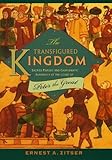The Transfigured Kingdom : Sacred Parody and Charismatic Authority at the Court of Peter the Great / Ernest A. Zitser.
Material type: TextSeries: Studies of the Harriman InstitutePublisher: Ithaca, NY : Cornell University Press, [2018]Copyright date: ©2017Description: 1 online resource (240 p.) : 10 b&w halftones, 3 figuresContent type:
TextSeries: Studies of the Harriman InstitutePublisher: Ithaca, NY : Cornell University Press, [2018]Copyright date: ©2017Description: 1 online resource (240 p.) : 10 b&w halftones, 3 figuresContent type: - 9781501711084
- 947/.05 22
- DK133 .Z58 2004eb
- online - DeGruyter
| Item type | Current library | Call number | URL | Status | Notes | Barcode | |
|---|---|---|---|---|---|---|---|
 eBook
eBook
|
Biblioteca "Angelicum" Pont. Univ. S.Tommaso d'Aquino Nuvola online | online - DeGruyter (Browse shelf(Opens below)) | Online access | Not for loan (Accesso limitato) | Accesso per gli utenti autorizzati / Access for authorized users | (dgr)9781501711084 |
Frontmatter -- Contents -- Acknowledgments -- Abbreviations -- Introduction -- 1. The Naryshkin Restoration -- 2. An Unconsecrated Company -- 3. Apostles and Apostates -- 4. Unholy Matrimony -- 5. Fathering the Fatherland -- Conclusion -- Appendix 1. Chronology -- Appendix 2. Members of the Unholy Council -- Bibliography -- Index
restricted access online access with authorization star
http://purl.org/coar/access_right/c_16ec
In this richly comparative analysis of late Muscovite and early Imperial court culture, Ernest A. Zitser provides a corrective to the secular bias of the scholarly literature about the reforms of Peter the Great. Zitser demonstrates that the tsar's supposedly "secularizing" reforms rested on a fundamentally religious conception of his personal political mission. In particular, Zitser shows that the carnivalesque (and often obscene) activities of the so-called Most Comical All-Drunken Council served as a type of Baroque political sacrament—a monarchical rite of power that elevated the tsar's person above normal men, guaranteed his prerogative over church affairs, and bound the participants into a community of believers in his God-given authority ("charisma"). The author suggests that by implicating Peter's "royal priesthood" in taboo-breaking, libertine ceremonies, the organizers of such "sacred parodies" inducted select members of the Russian political elite into a new system of distinctions between nobility and baseness, sacrality and profanity, tradition and modernity.Tracing the ways in which the tsar and his courtiers appropriated aspects of Muscovite and European traditions to suit their needs and aspirations, The Transfigured Kingdom offers one of the first discussions of the gendered nature of political power at the court of Russia's self-proclaimed "Father of the Fatherland" and reveals the role of symbolism, myth, and ritual in shaping political order in early modern Europe.
Mode of access: Internet via World Wide Web.
In English.
Description based on online resource; title from PDF title page (publisher's Web site, viewed 26. Apr 2024)


